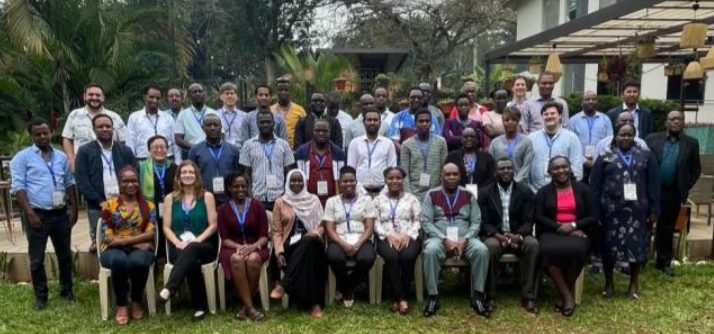17 September 2022, Addis Ababa, Uganda, USA: The Africa CDC – Africa Pathogen Genomics Initiative (Africa PGI) in collaboration with Infectious Diseases Research Collaboration (IDRC) in Uganda, the University of California, San Francisco (UCSF), and Johns Hopkins University (JHU) concluded a one-week hands-on training on Malaria Genomic Epidemiology and Data Analytics in Kampala, Uganda. A total of 34 participants from 7 African Union Member States successfully completed the training. Participating countries included Uganda, Ethiopia, Kenya, DRC, Tanzania, Rwanda, and Sudan. Participants were nominated from both research and public health institutions in these countries, with two training pathways tailored to the background and most pressing needs of the two groups.
The emergence and spread of drug-resistant malaria, mutated parasites that skip detection by commonly used rapid diagnostic tests, and the resurgence of malaria transmission in multiple countries are major threats to the control and ultimate elimination of malaria. A recent expansion of malaria genomics in Africa has enormous potential to help tackle these problems, but there is an urgent need to expand the workforce for the generation, analysis, interpretation and utilization of malaria molecular surveillance (MMS) data to fully realize this potential. To fill this gap, Africa CDC collaborated with IDRC, UCSF and JHU to develop and deploy an interactive, hands-on workshop, bringing together programmatic and research personnel to understand the uses of malaria genomics in augmenting public health surveillance, discuss the challenges in implementing such technology, and work together across institutions and countries to identity practical solutions.
“This training was a unique opportunity to bring together researchers and officers from the national malaria control program to support the expansion of malaria molecular surveillance to monitor the spread of drug and diagnostic resistance variants across Africa”, said Dr. Yenew Kebede, Head Division of Laboratory Systems and Networks and Acting Head of Division of Disease Surveillance and Intelligence at the Africa CDC. He further added, “The training will act as one of the avenues to bridge the gap between researchers who develop tools and generate data and the program officers who apply data to inform malaria control and elimination”.
“The knowledge and skills gained from this training workshop have the potential to further expand MMS in public health settings by facilitating networking and exchange of ideas between those working in programmatic and research settings.” said Bryan Greenhouse, Associate Professor and Co-director of the EPPIcenter program at the University of California, San Francisco.
“We hope that this training will inspire researchers and programs to work together to achieve the goal of integrating MMS into routine surveillance in their countries, with the longer-term goal of increased regional collaboration to prevent and respond to the spread of drug and diagnostic resistance,” said Jessica Briggs, Assistant Professor also from the University of California, San Francisco, who led development and delivery of the course.
The participants of this training were equipped with knowledge and skills required for the application of malaria genomic data for programmatic needs. The interactive modules in the present training workshop comprised of introduction to malaria epidemiology, molecular genomics, data management, bioinformatics and data analysis tools, translation of data into meaningful results, and ways to disseminate these results in multiple forums, along with the current state of high priority threats in the region. Trainers from the KEMRI-Wellcome Trust Research Programme in Kenya, the Armauer Hansen Research Institute (AHRI) in Ethiopia, and Brown University were also involved in the workshop.
For more information, contact:
Africa CDC – Africa PGI
Dr Sofonias Tessema
Program Lead – Africa PGI
Africa Centers for Disease Control and Prevention sofoniast@africa-union.org
University of California, San Francisco
Dr Bryan Greenhouse
Associate Professor and Co-director of the EPPIcenter
University of California, San Francisco bryan.greenhouse@ucsf.edu







